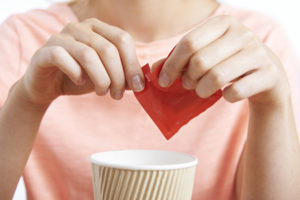
You may find it surprising that you’re not alone. Urinary incontinence is a rather common condition with an array of causes. Reducing the risk of leaks or accidents is the main goal, and certain lifestyle factors can help.
Here some places where sneaky bladder irritants could be hiding.
Artificial Sweeteners: Common artificial sweeteners like aspartame, acesulfame K, and sodium saccharin may lead to emergencies. These ingredients are found in diet beverages, flavored water, water enhancers, and other packaged goods.
Caffeinated beverages like coffee, soda, and tea can also irritate your bladder. It could act as a double-whammy if you’re sweetening these drinks with artificial sweeteners.
Healthful Foods: Healthful foods may also increase your urge to pee. Fruits and vegetables are often high in water, while they can also feature other compounds that can lead to bladder contractions. Some items to monitor include:
- Tomatoes
- Apples
- Citrus fruits
- Cantaloupe
- Chili/Spicy foods
- Chocolate
- Peaches
- Strawberries
- Plums
Limiting the intake of these items may help reduce the risk of urine leaks and accidents. You can substitute with low-acid fruit like pears and watermelon.
Determining if any of these items are affecting your bladder will take some experimentation. Remove them from your diet for a couple of weeks and see if you notice any improvement.
The benefits of hydration outweigh the dangers of cutting back water intake, so continue to target at least eight water glasses per day and more if you’re highly active. Pay attention to urine color to make sure you’re drinking enough.
Working with your doctor to come up with an effective treatment plan for urinary incontinence is highly recommended, but testing the above items can be a great place to start.